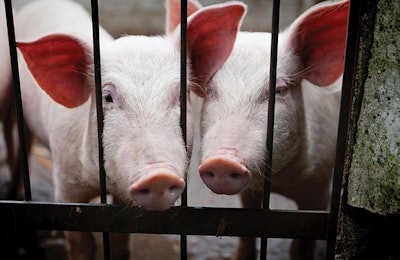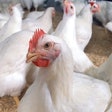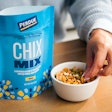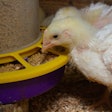
Just as for antibiotics, there is no one answer, or additive, to replace zinc oxide in piglet diets. Instead, there needs to be a greater understanding of the causes and contributing factors, to diarrhea at weaning. Key areas of investigation include the intestinal microflora, gut health, immunity and diet digestibility.
Diet formulation, including optimal enzyme additions, can have positive effects on gut health. The use of additives including organic acids, fatty acids and probiotics help to reduce pathogenic and increase beneficial bacteria within the intestine.
The problem with zinc oxide
While the exact mode of action of zinc oxide in piglet diets in unknown, the reason for its addition is clear. It is used to prevent diarrhea in piglets at weaning and, as such, it’s been added at high levels in most pig starter diets for many years.
However, the EU had decided to ban its use from 2022, due to animal and public health, as well as environmental concerns. Some of the zinc fed to piglets accumulates in their vital organs, potentially affecting health and performance; while the rest is excreted where is can pollute soil and water.
Zinc oxide is also understood to contribute to the developments of resistance to antibiotics, another challenge with which it is coupled. Antibiotics would be an alternative approach to treating diarrhea but, as their use is limited, alternative solutions need to be found.
Microbiome diversity
A diverse and balanced microbiome means beneficial bacteria will outcompete disease-causing organisms. And as a result, gut health is improved and incidences of diarrhea are less likely. Animals are also more likely to be able to overcome disease challenges and growth will be at an optimal level.
Zinc oxide is known to prevent diarrhea, but it may not have an entirely positive impact on the gut flora. A significant reduction in the number of lactic acid bacteria has been found when piglets were fed high levels of zinc oxide. And this is thought to be why diarrhea occurs when the additive is removed from the diet. The piglet's gut flora is not able to defend itself against the proliferation of pathogenic species.
So, instead of suppressing a piglet’s gut flora, would it not be better to support a diverse and balanced microbiome? Probiotics are able to do just that by either introducing lactic acid-producing species or other beneficial microorganisms that help to create a positive gut environment. Improvements in the piglet gut microbiome are seen — more lactic acid-producing bacteria and less pathogenic species are present.
Immune support
By supporting the gut microbiome, the immune system is also supported, and piglet performance is optimized. This means probiotics will help piglets fight microbial challenges, deal with dietary changes and overcome weaning stress — all of which can result in diarrhea. Intestinal barrier function and inflammatory responses can also be influenced by the use of probiotics, helping to prevent gastric upset.
Other immune-supportive additives include antioxidants, plant extracts and essential oils. These have several effects including reducing the negative effects of stress on the immune system and supporting gut health. Short-chain fatty acids (SCFAs) are the preferred energy source of gut epithelial cells. They promote villi growth, improve absorption of nutrients and are involved in the repair of damaged cells. Their dietary inclusion, along with medium chain fatty acids, has been shown to inhibit the growth of pathogenic bacteria. SCFAs have positive effects on the immune system as well as anti-inflammatory actions.
Acidification
The supplementation of organic acids at the right high doses in animal feed can increase body weight, improve feed conversion ratio and reduce colonization of pathogens in the intestine, more specifically:
- Decrease the pH value and the buffering capacity of the feed — as well as antibacterial and antifungal effects
- Reduce pH value by release of hydrogen ions in the stomach, thereby activating pepsinogen to form pepsin and improving protein digestibility
- Inhibit gram-negative indigenous microflora in the gastrointestinal tract
Organic acid products are also available for dosing into water. This improves the quality of the water by preventing microbial growth but also improves gut health once ingested. So, in terms of preventing diarrhea, acidification of feed or water could help piglets cope with bacterial challenges as well as dietary changes.
Reducing protein levels
Bacteria such as E. coli feed on undigested protein in the gut and proliferate. Reducing crude protein levels in weaning diets is one answer, as long as adequate amino acid availability is ensured, otherwise growth rate would be reduced.
Considering nitrogen emissions and the impact of soy, there are nutritional and environmental reasons to investigate ways of reducing protein usage. Protein optimizers, highly digestible protein sources and fermented protein products, have all been tested in piglet diets. In the case of the latter, an increase in lactobacilli populations were seen. The added benefit of reducing protein levels is that nitrogen excretion is reduced.
Digestibility
The use of enzymes to get more out of diets fed is standard practice to improve the economics of production. However, improvements in gut health and optimization of nutrient levels are also important, particularly in young animals, where their digestive system is immature and they are coping with significant dietary changes.
By improving protein utilization, proteases can allow the use of a low-protein diet, without seeing a drop in performance. Improvements in weight gain and feed conversion associated with the use of proteases are often more than can be accounted for by improved amino acid availability alone. It is believed that this relates to the role proteases play in improving gut health and integrity.
The anti-nutritive effects of non-starch polysaccharides and phytate on digestibility and the gut microflora are also important. Phytase and carbohydrase additions should be evaluated to ensure optimum nutrient availability and minimum influence of anti-nutritive effects.
For better or worse
While many producers are not happy with the ban on zinc, others see it as an opportunity. Recent studies, although confirming the beneficial effect of zinc oxide, found that it increased gut inflammation. Researchers, in fact, think zinc oxide has a negative effect on the immune system. And it is its function of limiting the development of a healthy and diverse gut microflora that is another reason for its prohibition. Although diarrhea will affect growth and days to slaughter, poor gut health will affect performance and reduce pigs' ability to deal with dietary and disease challenges.
It is clear that producers and nutritionists will have to focus on management techniques and dietary solutions to support the gut health of piglets at weaning. Something they are already doing in light of the pressure to be “antibiotic free.” An overall dietary strategy is required to prevent the causes of diarrhea and, in so doing, promote health and performance.

















